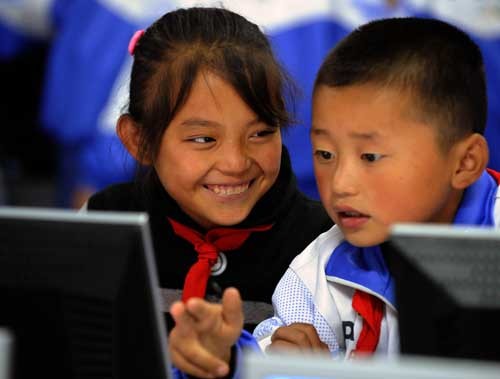 |
| (Xinhua) |
As students in Peking University and Tsinghua University, two top universities in China, start their fall semester, tens of thousands of people who did not make it through the elite schools' grueling admissions process will also be able to take classes there - in front of their computer. The two schools are joining the world's top universities in the MOOC movement.
A MOOC, short for massive online open course, brings together top professors from elite universities from around the world to anyone anywhere with Internet access. The movement has been described as an avalanche permanently altering the landscape of higher education.
Between the two schools, they have released a dozen courses on edX, a non-profit organization founded by Harvard and MIT in 2012, and Coursera, another MOOC platform founded by two Harvard professors.
As MOOCs have swept the world in the past two years, Chinese universities are playing catch up, hoping to improve domestic education as well as to increase their international presence.
MOOCs are the latest development in sharing education resources online in the past decade. While online courses such as Professor Michael Sandel's Justice allow Chinese students to watch videos of his lectures as delivered at Harvard, an MOOC is an actual course designed for Web users with a more direct one-on-one interaction. Students have to finish assignments before deadlines and take final exams to earn a certificate of completion.
Such online courses attract lots of Chinese people, who have long been dissatisfied with Chinese higher education. Now Chinese universities are responding to the challenge. In March, Zhou Qifeng, speaking as out-going president of Peking University, said the school must not fall behind. "This [offering MOOCs] would improve the quality of our education as well as promote our school's international impact," said Zhou. "In fact, it might be a matter of life and death [for the school]."
Joining the club
In May, Tshinghua and Peking universities announced that they are joining edX. On September 8, Peking University joined Coursera.
In July, it was reported that Fudan University and Shanghai Jiaotong University are joining Coursera, although neither school is listed on the Coursera website as its partners and there has been no sign of any courses from the two schools being offered any time soon.
After joining edX, both Peking and Tshinghua universities started to invite teachers to join, especially those whose courses are well-received on campus.
Tsinghua plans to offer four courses in the first year on edX. Two courses, Principles of Electric Circuits and History of Chinese Architecture, are expected to start this week.
Peking University has released four courses on edX and six on Coursera. Most have started since late September.
Most of the courses offered by the two schools are STEM (science, technology, engineering and mathematics) disciplines such as Introduction to Computing, Data Structures and Algorithms, or Principles of Electric Circuits. But there are also courses such as the Study of Folklore and Music in the 20th Century and World Art History. The courses do not appear to have a strong "Chinese characteristics" so to speak but are mostly introductory courses. There are also courses like History of Chinese Architecture from Tsinghua on edX.

 2013 Colour Me Rad 5K run held in Canada
2013 Colour Me Rad 5K run held in Canada China's destroyer Qingdao sails out of Sydney Harbor
China's destroyer Qingdao sails out of Sydney Harbor Chinese tycoon aims to restore London's Crystal Palace
Chinese tycoon aims to restore London's Crystal Palace Worst flooding hits Yuyao, 70% of downtown area underwater
Worst flooding hits Yuyao, 70% of downtown area underwater Game for the brave: 'Spiders' in Yandang Mountains
Game for the brave: 'Spiders' in Yandang Mountains Hungarian wingsuit flyer confirmed dead in Zhangjiajie
Hungarian wingsuit flyer confirmed dead in Zhangjiajie New couples take wedding photos during holiday
New couples take wedding photos during holiday Serena Williams stumbles through to quarterfinals
Serena Williams stumbles through to quarterfinals Thailand Mobile Expo 2013 kicks off
Thailand Mobile Expo 2013 kicks off Photo collection of Chinese Navy
Photo collection of Chinese Navy Photo story: Young tenants in Beijing
Photo story: Young tenants in Beijing Twins Culture Festival kicks off in Beijing
Twins Culture Festival kicks off in Beijing UNESCO world heritage site: Montale Tower
UNESCO world heritage site: Montale Tower Israeli drone crashes into Mediterranean, fragments recovered
Israeli drone crashes into Mediterranean, fragments recovered Serena Williams wins second China Open title
Serena Williams wins second China Open titleDay|Week|Month